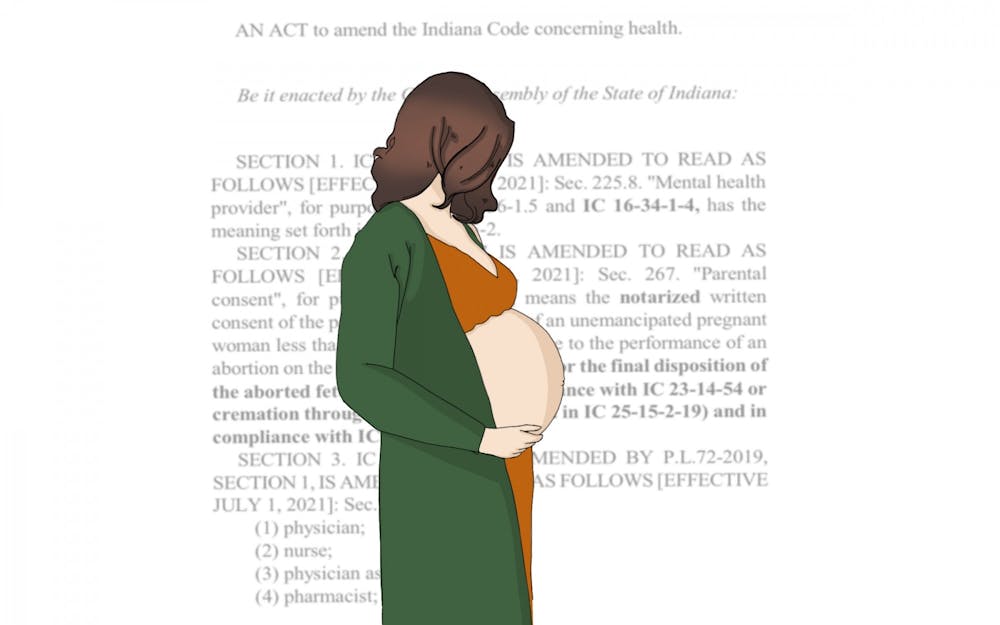Since Roe v. Wade upheld the constitutional right to safe abortion on Jan. 22, 1973, Indiana has passed 64 pieces of legislation intended to narrow access to abortion.
HB 1577, currently awaiting Gov. Eric Holcomb’s signature, constitutes the latest in Indiana’s long history of attempts to limit Hoosiers’ rights to reproductive healthcare. The bill, already passed by the Indiana House and Senate, would subject patients to dangerous misinformation and limit access to medication-induced abortions.
The bill’s authors are weaponizing their legislative power to inflict shame and hardship upon Hoosiers seeking abortions.
The most harrowing provision in the legislation is the requirement for physicians to inform patients of the pseudoscientific prospect of an abortion reversal from a medication-induced abortion.
Medication-induced abortion requires patients to take two consecutive pills. Abortion reversal is the false claim that not taking the second pill or taking a large dose of the hormone progesterone reverses an abortion.
This claim is unscientific and incredibly dangerous. Medical researchers attempting to study the effects of abortion reversal medication had to stop conducting the study after women participating in it were hospitalized for severe hemorrhaging. The American College of Obstetricians and Gynecologists, the primary professional association for physicians in this field, has taken a firm stance against abortion reversal treatment because the methods are “not based on science and do not meet clinical standards.”
“[Physicians] would be required to give [patients] information about these completely uncertified, unverified physicians who… push this idea of abortion reversal that is completely unfounded by any science and significantly potentially dangerous,” Dr. Caitlin Bernard, faculty at IU School of Medicine, said. Bernard said she was not speaking on behalf of IU School of Medicine.
The blatant misinformation does not end with abortion reversal. HB 1577 also requires physicians to inform patients that a fetus can feel pain at or before 20 weeks post-fertilization age. Once again, this information is entirely unscientific. Medical research suggests that fetuses are incapable of feeling pain until reaching a gestational age of 29 or 30 weeks.
In the face of this evidence, the only purpose of this requirement is to instill shame.
“I think the intent of it is to provide misinformation to make patients feel ashamed or dissuade them from obtaining abortion care,” Bernard said. “Giving them misinformation makes it more difficult to take care of them.”
The bill’s authors sacrifice the health of pregnant Hoosiers to advance their moral objection to abortion.
In case this misinformation isn’t enough to deter patients from seeking abortions, HB 1577 constructs additional barriers to abortion access.
The bill would prevent pregnant people from receiving medication-induced abortions after eight weeks post-fertilization. Planned Parenthood of Indiana does not currently provide medication abortions after the gestational age of ten weeks, the equivalent of eight weeks post-fertilization, Bernard said.
Research suggests medication-induced abortion is safe through a gestational age of 11 weeks. But this legislation would not allow physicians to improve their practices following continued medical advancements.
“People who make decisions based on evidence are medical bodies,” Bernard said. “They should be the ones to tell us based on evidence what is safe and what is unsafe, not an Indiana legislature.”
HB 1577 also requires parental consent forms obtained by minors seeking abortions to be notarized. Applying this notary requirement uniquely to abortion is an obvious attempt to invent arbitrary hurdles to patients seeking abortions.
“There is no other area of medicine where a notary is required, for anything, ever,” Bernard said.
The legislation also reiterates a ban on the use of telemedicine to provide abortion, which is already forbidden under Indiana Code. Indiana law requires patients seeking abortion to undergo mandatory counseling followed by a 24-hour wait period before receiving an abortion.
In Indiana, 70% of women live in counties where there is no clinic providing abortions, forcing them to travel long distances to the clinic for two consecutive appointments to seek an abortion.
“It would definitely be helpful to improve access if we were able to provide telemedicine services,” Bernard said.
It is clear that this legislation is the Indiana legislature’s attempt to strip Hoosiers of access to abortion, and this should be particularly worrisome for college students. Over half of all patients who undergo abortion are in their twenties, and one in seven women who have had abortions reported that they did so in order to continue their education.
IU Student Government Congress passed Proclamation 116 denouncing HB 1577 and encouraging students to contact their senators and representatives. Concerned students should urge Gov. Holcomb not to sign HB 1577.
This is a blatant attempt to erode access to abortion in Indiana, and Hoosiers’ reproductive health hangs in the balance.
Maddie Butler (she/her) is a sophomore studying international law and institutions and Arabic. She is the Director-General of Indiana Model United Nations.






